Analysing Strategic Choice and Determinist Theories in Organisation
VerifiedAdded on 2023/06/11
|13
|3387
|495
Essay
AI Summary
This essay critically analyses the contribution of strategic choice and determinist theories, including Resource Dependency Theory, Institutional Theory, and Population Ecology, to our understanding of organisational action. It discusses the core principles of each theory, examining their arguments and contra-arguments related to environmental factors, decision-making processes, control mechanisms, and market influences. The essay also presents a hypothesis regarding the interplay between strategic choice and determinism, using arguments and counter-arguments to support the analysis. Ultimately, the essay aims to determine which perspective, strategic choice or determinism, provides a more compelling explanation of organisational behaviour, while also acknowledging the complexities in creating a universal theory of organisation. Desklib provides access to this essay along with a wealth of other student-contributed documents.
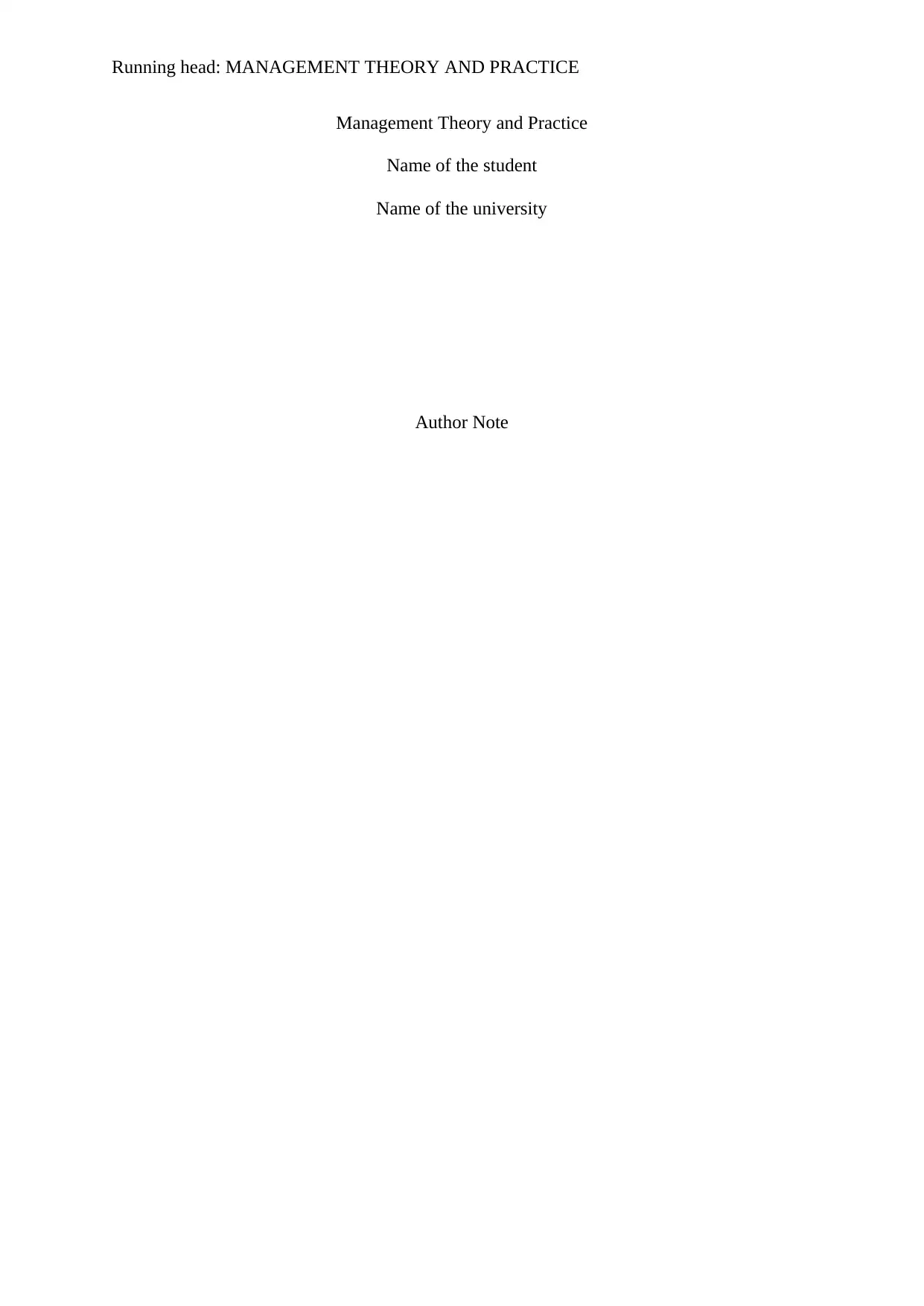
Running head: MANAGEMENT THEORY AND PRACTICE
Management Theory and Practice
Name of the student
Name of the university
Author Note
Management Theory and Practice
Name of the student
Name of the university
Author Note
Paraphrase This Document
Need a fresh take? Get an instant paraphrase of this document with our AI Paraphraser
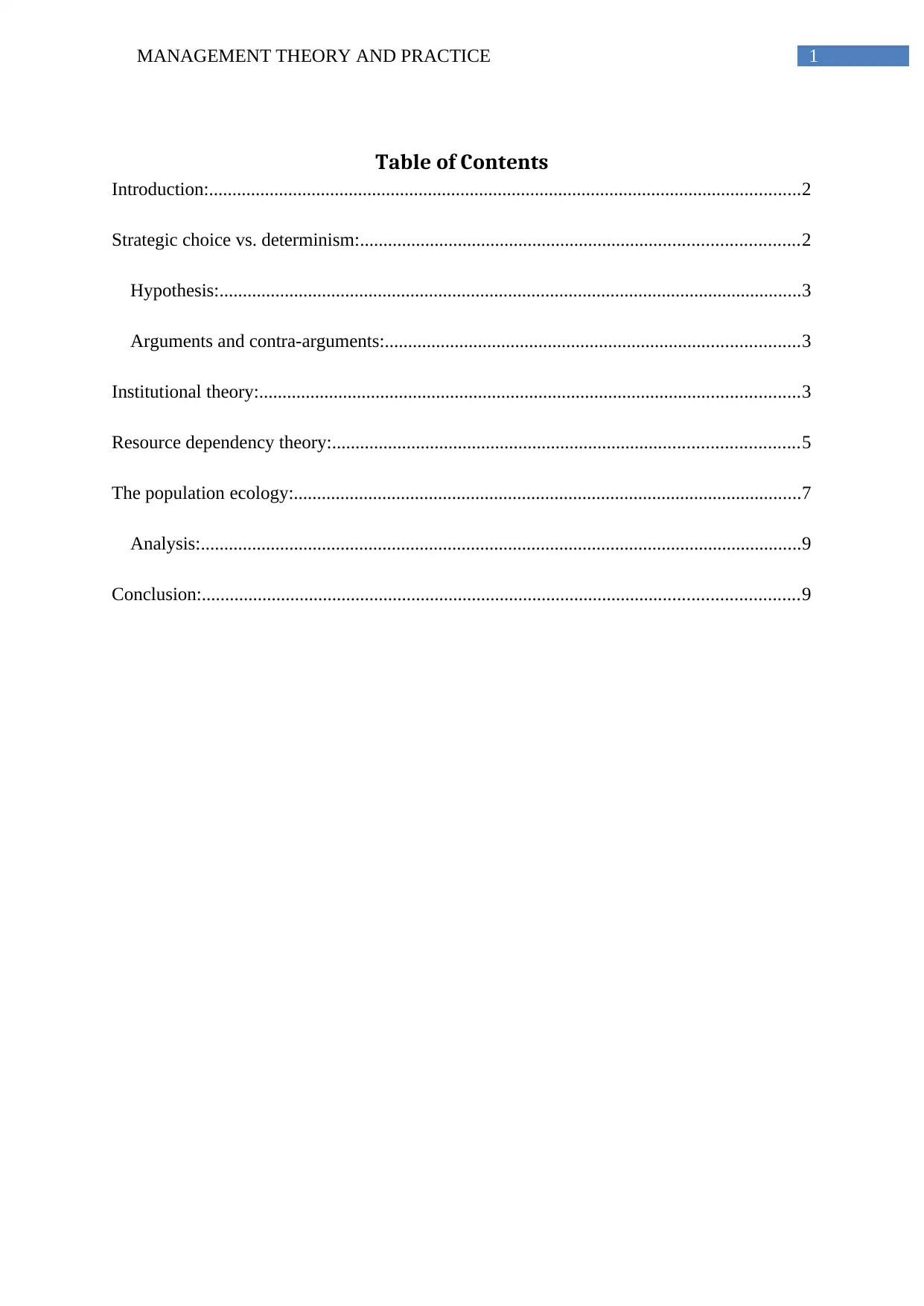
1MANAGEMENT THEORY AND PRACTICE
Table of Contents
Introduction:...............................................................................................................................2
Strategic choice vs. determinism:..............................................................................................2
Hypothesis:.............................................................................................................................3
Arguments and contra-arguments:.........................................................................................3
Institutional theory:....................................................................................................................3
Resource dependency theory:....................................................................................................5
The population ecology:.............................................................................................................7
Analysis:.................................................................................................................................9
Conclusion:................................................................................................................................9
Table of Contents
Introduction:...............................................................................................................................2
Strategic choice vs. determinism:..............................................................................................2
Hypothesis:.............................................................................................................................3
Arguments and contra-arguments:.........................................................................................3
Institutional theory:....................................................................................................................3
Resource dependency theory:....................................................................................................5
The population ecology:.............................................................................................................7
Analysis:.................................................................................................................................9
Conclusion:................................................................................................................................9
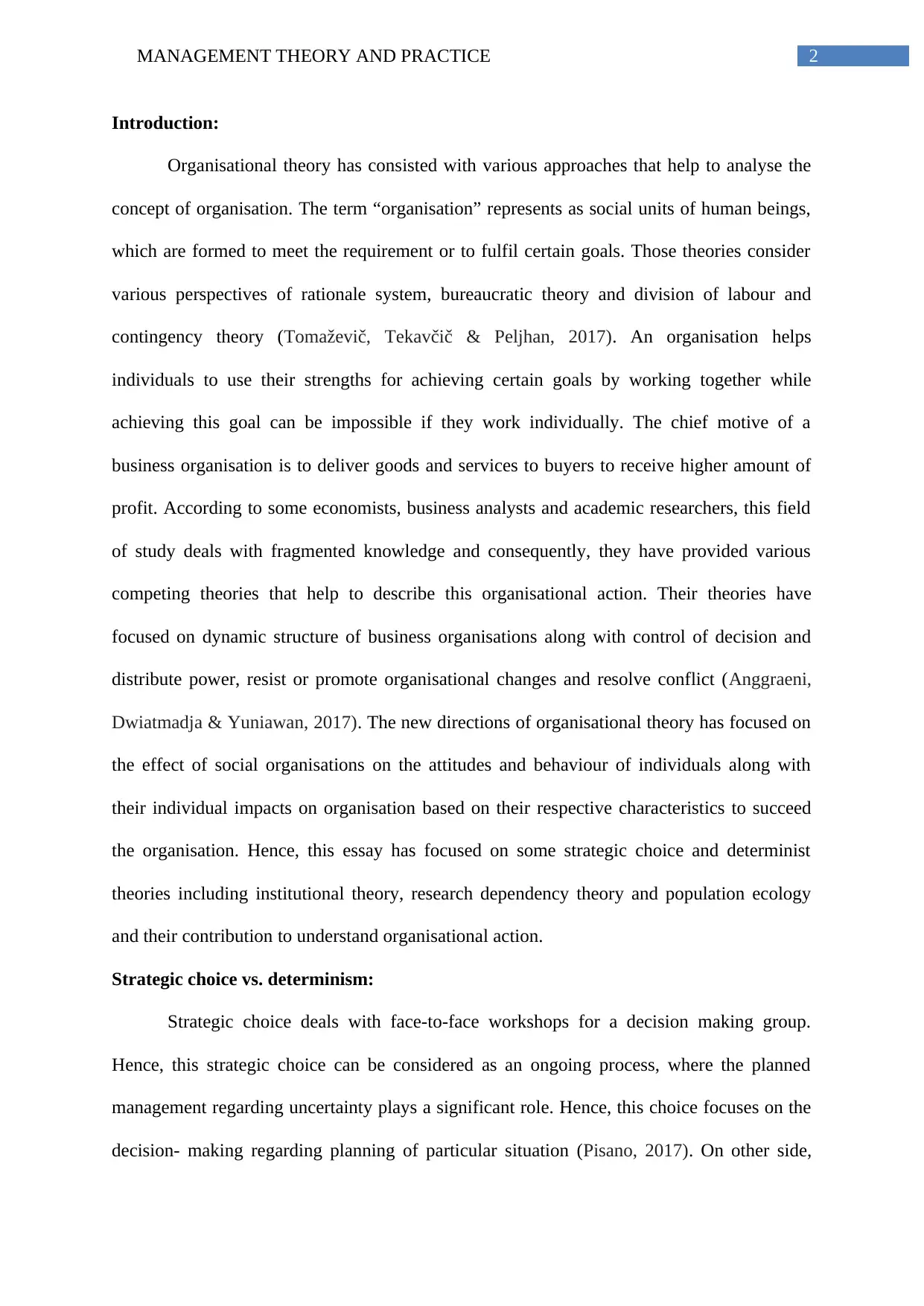
2MANAGEMENT THEORY AND PRACTICE
Introduction:
Organisational theory has consisted with various approaches that help to analyse the
concept of organisation. The term “organisation” represents as social units of human beings,
which are formed to meet the requirement or to fulfil certain goals. Those theories consider
various perspectives of rationale system, bureaucratic theory and division of labour and
contingency theory (Tomaževič, Tekavčič & Peljhan, 2017). An organisation helps
individuals to use their strengths for achieving certain goals by working together while
achieving this goal can be impossible if they work individually. The chief motive of a
business organisation is to deliver goods and services to buyers to receive higher amount of
profit. According to some economists, business analysts and academic researchers, this field
of study deals with fragmented knowledge and consequently, they have provided various
competing theories that help to describe this organisational action. Their theories have
focused on dynamic structure of business organisations along with control of decision and
distribute power, resist or promote organisational changes and resolve conflict (Anggraeni,
Dwiatmadja & Yuniawan, 2017). The new directions of organisational theory has focused on
the effect of social organisations on the attitudes and behaviour of individuals along with
their individual impacts on organisation based on their respective characteristics to succeed
the organisation. Hence, this essay has focused on some strategic choice and determinist
theories including institutional theory, research dependency theory and population ecology
and their contribution to understand organisational action.
Strategic choice vs. determinism:
Strategic choice deals with face-to-face workshops for a decision making group.
Hence, this strategic choice can be considered as an ongoing process, where the planned
management regarding uncertainty plays a significant role. Hence, this choice focuses on the
decision- making regarding planning of particular situation (Pisano, 2017). On other side,
Introduction:
Organisational theory has consisted with various approaches that help to analyse the
concept of organisation. The term “organisation” represents as social units of human beings,
which are formed to meet the requirement or to fulfil certain goals. Those theories consider
various perspectives of rationale system, bureaucratic theory and division of labour and
contingency theory (Tomaževič, Tekavčič & Peljhan, 2017). An organisation helps
individuals to use their strengths for achieving certain goals by working together while
achieving this goal can be impossible if they work individually. The chief motive of a
business organisation is to deliver goods and services to buyers to receive higher amount of
profit. According to some economists, business analysts and academic researchers, this field
of study deals with fragmented knowledge and consequently, they have provided various
competing theories that help to describe this organisational action. Their theories have
focused on dynamic structure of business organisations along with control of decision and
distribute power, resist or promote organisational changes and resolve conflict (Anggraeni,
Dwiatmadja & Yuniawan, 2017). The new directions of organisational theory has focused on
the effect of social organisations on the attitudes and behaviour of individuals along with
their individual impacts on organisation based on their respective characteristics to succeed
the organisation. Hence, this essay has focused on some strategic choice and determinist
theories including institutional theory, research dependency theory and population ecology
and their contribution to understand organisational action.
Strategic choice vs. determinism:
Strategic choice deals with face-to-face workshops for a decision making group.
Hence, this strategic choice can be considered as an ongoing process, where the planned
management regarding uncertainty plays a significant role. Hence, this choice focuses on the
decision- making regarding planning of particular situation (Pisano, 2017). On other side,
⊘ This is a preview!⊘
Do you want full access?
Subscribe today to unlock all pages.

Trusted by 1+ million students worldwide
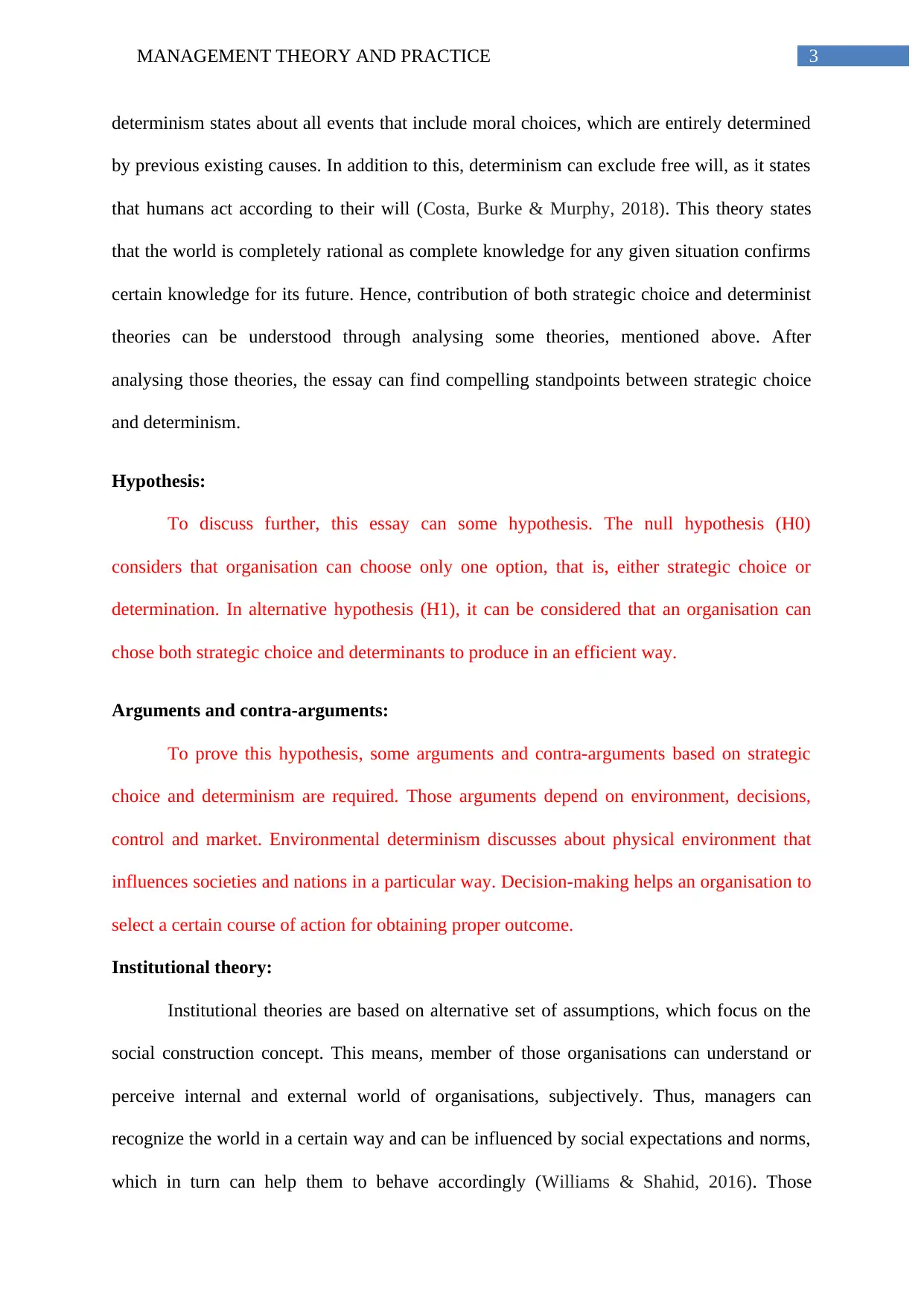
3MANAGEMENT THEORY AND PRACTICE
determinism states about all events that include moral choices, which are entirely determined
by previous existing causes. In addition to this, determinism can exclude free will, as it states
that humans act according to their will (Costa, Burke & Murphy, 2018). This theory states
that the world is completely rational as complete knowledge for any given situation confirms
certain knowledge for its future. Hence, contribution of both strategic choice and determinist
theories can be understood through analysing some theories, mentioned above. After
analysing those theories, the essay can find compelling standpoints between strategic choice
and determinism.
Hypothesis:
To discuss further, this essay can some hypothesis. The null hypothesis (H0)
considers that organisation can choose only one option, that is, either strategic choice or
determination. In alternative hypothesis (H1), it can be considered that an organisation can
chose both strategic choice and determinants to produce in an efficient way.
Arguments and contra-arguments:
To prove this hypothesis, some arguments and contra-arguments based on strategic
choice and determinism are required. Those arguments depend on environment, decisions,
control and market. Environmental determinism discusses about physical environment that
influences societies and nations in a particular way. Decision-making helps an organisation to
select a certain course of action for obtaining proper outcome.
Institutional theory:
Institutional theories are based on alternative set of assumptions, which focus on the
social construction concept. This means, member of those organisations can understand or
perceive internal and external world of organisations, subjectively. Thus, managers can
recognize the world in a certain way and can be influenced by social expectations and norms,
which in turn can help them to behave accordingly (Williams & Shahid, 2016). Those
determinism states about all events that include moral choices, which are entirely determined
by previous existing causes. In addition to this, determinism can exclude free will, as it states
that humans act according to their will (Costa, Burke & Murphy, 2018). This theory states
that the world is completely rational as complete knowledge for any given situation confirms
certain knowledge for its future. Hence, contribution of both strategic choice and determinist
theories can be understood through analysing some theories, mentioned above. After
analysing those theories, the essay can find compelling standpoints between strategic choice
and determinism.
Hypothesis:
To discuss further, this essay can some hypothesis. The null hypothesis (H0)
considers that organisation can choose only one option, that is, either strategic choice or
determination. In alternative hypothesis (H1), it can be considered that an organisation can
chose both strategic choice and determinants to produce in an efficient way.
Arguments and contra-arguments:
To prove this hypothesis, some arguments and contra-arguments based on strategic
choice and determinism are required. Those arguments depend on environment, decisions,
control and market. Environmental determinism discusses about physical environment that
influences societies and nations in a particular way. Decision-making helps an organisation to
select a certain course of action for obtaining proper outcome.
Institutional theory:
Institutional theories are based on alternative set of assumptions, which focus on the
social construction concept. This means, member of those organisations can understand or
perceive internal and external world of organisations, subjectively. Thus, managers can
recognize the world in a certain way and can be influenced by social expectations and norms,
which in turn can help them to behave accordingly (Williams & Shahid, 2016). Those
Paraphrase This Document
Need a fresh take? Get an instant paraphrase of this document with our AI Paraphraser
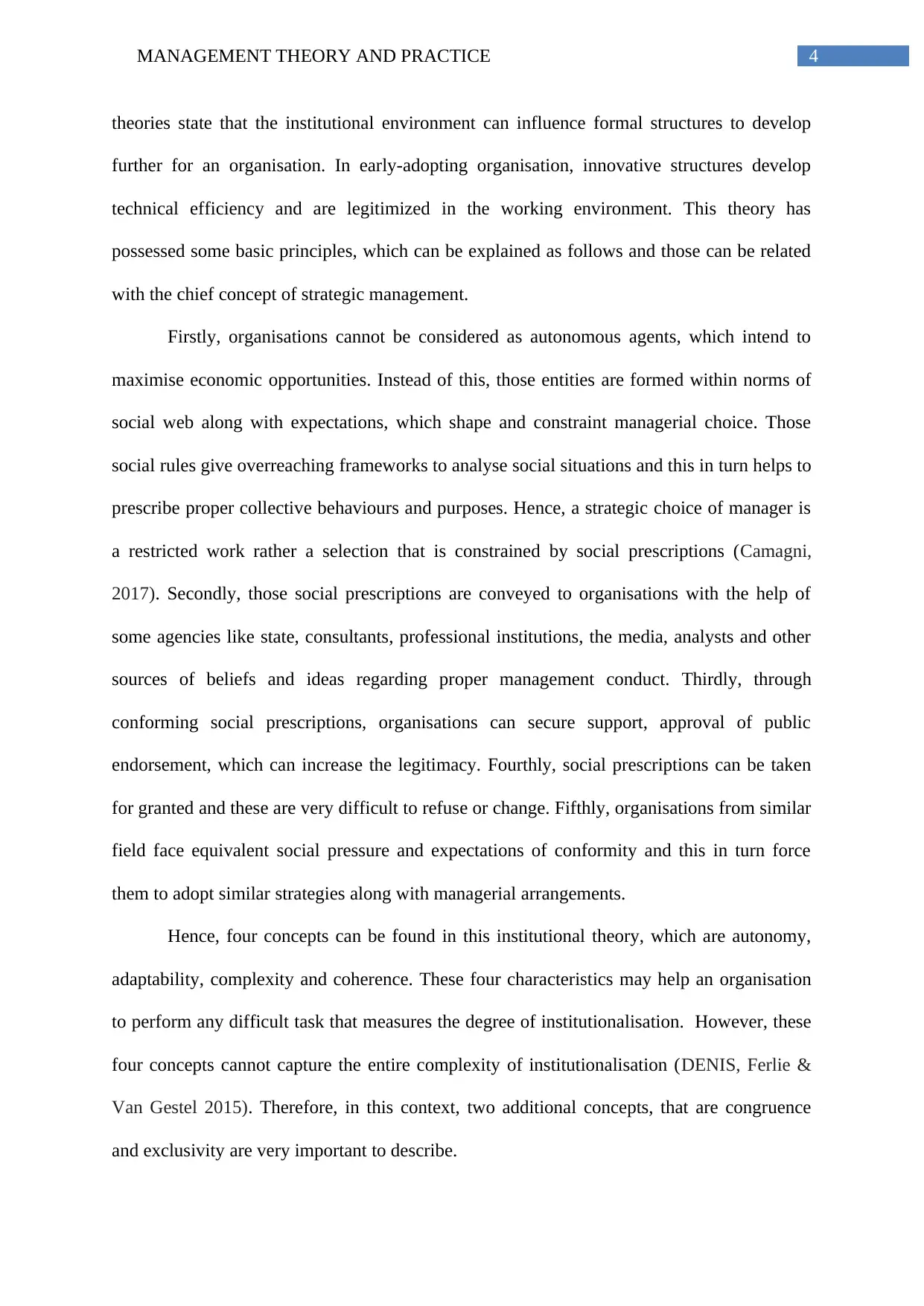
4MANAGEMENT THEORY AND PRACTICE
theories state that the institutional environment can influence formal structures to develop
further for an organisation. In early-adopting organisation, innovative structures develop
technical efficiency and are legitimized in the working environment. This theory has
possessed some basic principles, which can be explained as follows and those can be related
with the chief concept of strategic management.
Firstly, organisations cannot be considered as autonomous agents, which intend to
maximise economic opportunities. Instead of this, those entities are formed within norms of
social web along with expectations, which shape and constraint managerial choice. Those
social rules give overreaching frameworks to analyse social situations and this in turn helps to
prescribe proper collective behaviours and purposes. Hence, a strategic choice of manager is
a restricted work rather a selection that is constrained by social prescriptions (Camagni,
2017). Secondly, those social prescriptions are conveyed to organisations with the help of
some agencies like state, consultants, professional institutions, the media, analysts and other
sources of beliefs and ideas regarding proper management conduct. Thirdly, through
conforming social prescriptions, organisations can secure support, approval of public
endorsement, which can increase the legitimacy. Fourthly, social prescriptions can be taken
for granted and these are very difficult to refuse or change. Fifthly, organisations from similar
field face equivalent social pressure and expectations of conformity and this in turn force
them to adopt similar strategies along with managerial arrangements.
Hence, four concepts can be found in this institutional theory, which are autonomy,
adaptability, complexity and coherence. These four characteristics may help an organisation
to perform any difficult task that measures the degree of institutionalisation. However, these
four concepts cannot capture the entire complexity of institutionalisation (DENIS, Ferlie &
Van Gestel 2015). Therefore, in this context, two additional concepts, that are congruence
and exclusivity are very important to describe.
theories state that the institutional environment can influence formal structures to develop
further for an organisation. In early-adopting organisation, innovative structures develop
technical efficiency and are legitimized in the working environment. This theory has
possessed some basic principles, which can be explained as follows and those can be related
with the chief concept of strategic management.
Firstly, organisations cannot be considered as autonomous agents, which intend to
maximise economic opportunities. Instead of this, those entities are formed within norms of
social web along with expectations, which shape and constraint managerial choice. Those
social rules give overreaching frameworks to analyse social situations and this in turn helps to
prescribe proper collective behaviours and purposes. Hence, a strategic choice of manager is
a restricted work rather a selection that is constrained by social prescriptions (Camagni,
2017). Secondly, those social prescriptions are conveyed to organisations with the help of
some agencies like state, consultants, professional institutions, the media, analysts and other
sources of beliefs and ideas regarding proper management conduct. Thirdly, through
conforming social prescriptions, organisations can secure support, approval of public
endorsement, which can increase the legitimacy. Fourthly, social prescriptions can be taken
for granted and these are very difficult to refuse or change. Fifthly, organisations from similar
field face equivalent social pressure and expectations of conformity and this in turn force
them to adopt similar strategies along with managerial arrangements.
Hence, four concepts can be found in this institutional theory, which are autonomy,
adaptability, complexity and coherence. These four characteristics may help an organisation
to perform any difficult task that measures the degree of institutionalisation. However, these
four concepts cannot capture the entire complexity of institutionalisation (DENIS, Ferlie &
Van Gestel 2015). Therefore, in this context, two additional concepts, that are congruence
and exclusivity are very important to describe.
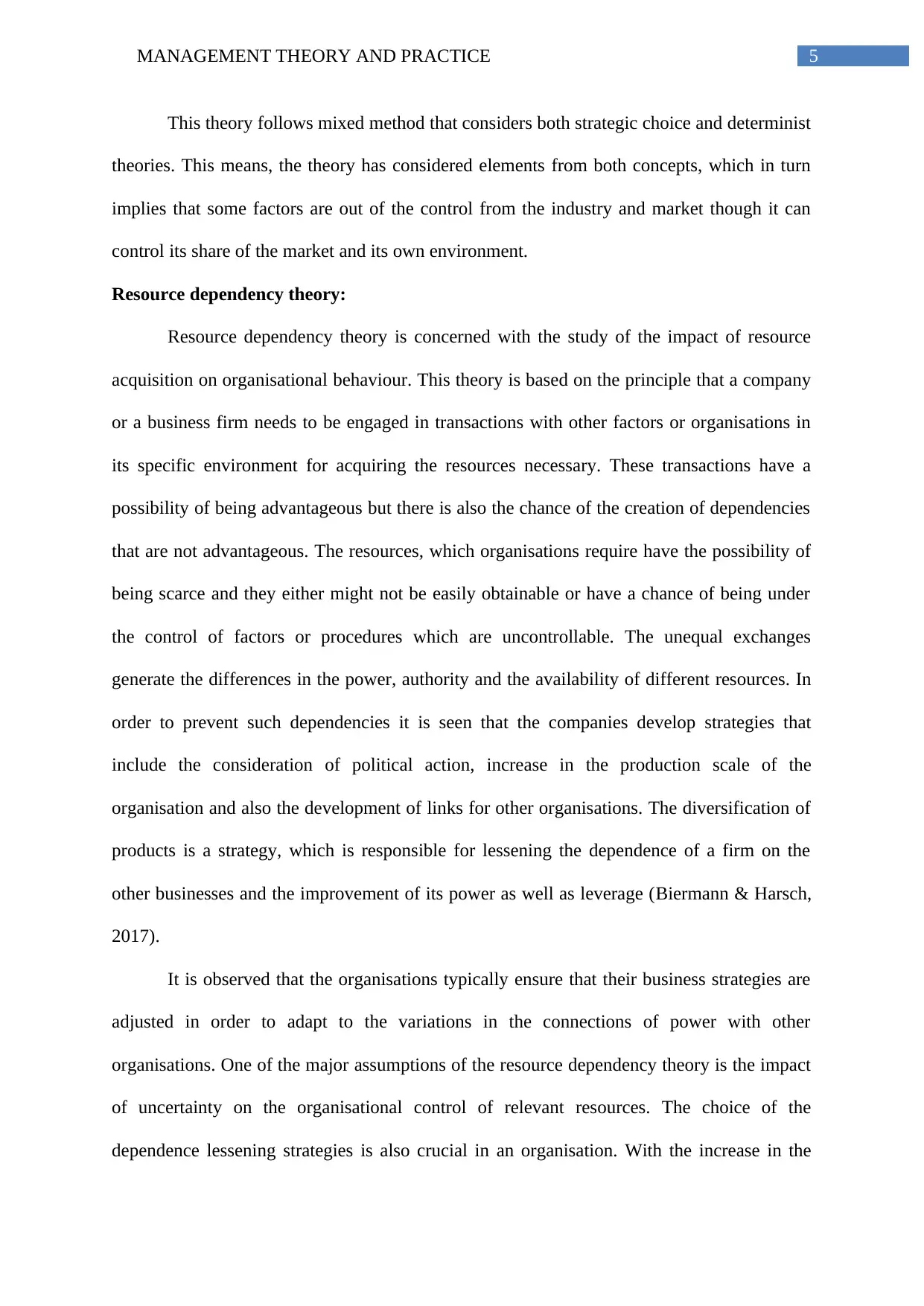
5MANAGEMENT THEORY AND PRACTICE
This theory follows mixed method that considers both strategic choice and determinist
theories. This means, the theory has considered elements from both concepts, which in turn
implies that some factors are out of the control from the industry and market though it can
control its share of the market and its own environment.
Resource dependency theory:
Resource dependency theory is concerned with the study of the impact of resource
acquisition on organisational behaviour. This theory is based on the principle that a company
or a business firm needs to be engaged in transactions with other factors or organisations in
its specific environment for acquiring the resources necessary. These transactions have a
possibility of being advantageous but there is also the chance of the creation of dependencies
that are not advantageous. The resources, which organisations require have the possibility of
being scarce and they either might not be easily obtainable or have a chance of being under
the control of factors or procedures which are uncontrollable. The unequal exchanges
generate the differences in the power, authority and the availability of different resources. In
order to prevent such dependencies it is seen that the companies develop strategies that
include the consideration of political action, increase in the production scale of the
organisation and also the development of links for other organisations. The diversification of
products is a strategy, which is responsible for lessening the dependence of a firm on the
other businesses and the improvement of its power as well as leverage (Biermann & Harsch,
2017).
It is observed that the organisations typically ensure that their business strategies are
adjusted in order to adapt to the variations in the connections of power with other
organisations. One of the major assumptions of the resource dependency theory is the impact
of uncertainty on the organisational control of relevant resources. The choice of the
dependence lessening strategies is also crucial in an organisation. With the increase in the
This theory follows mixed method that considers both strategic choice and determinist
theories. This means, the theory has considered elements from both concepts, which in turn
implies that some factors are out of the control from the industry and market though it can
control its share of the market and its own environment.
Resource dependency theory:
Resource dependency theory is concerned with the study of the impact of resource
acquisition on organisational behaviour. This theory is based on the principle that a company
or a business firm needs to be engaged in transactions with other factors or organisations in
its specific environment for acquiring the resources necessary. These transactions have a
possibility of being advantageous but there is also the chance of the creation of dependencies
that are not advantageous. The resources, which organisations require have the possibility of
being scarce and they either might not be easily obtainable or have a chance of being under
the control of factors or procedures which are uncontrollable. The unequal exchanges
generate the differences in the power, authority and the availability of different resources. In
order to prevent such dependencies it is seen that the companies develop strategies that
include the consideration of political action, increase in the production scale of the
organisation and also the development of links for other organisations. The diversification of
products is a strategy, which is responsible for lessening the dependence of a firm on the
other businesses and the improvement of its power as well as leverage (Biermann & Harsch,
2017).
It is observed that the organisations typically ensure that their business strategies are
adjusted in order to adapt to the variations in the connections of power with other
organisations. One of the major assumptions of the resource dependency theory is the impact
of uncertainty on the organisational control of relevant resources. The choice of the
dependence lessening strategies is also crucial in an organisation. With the increase in the
⊘ This is a preview!⊘
Do you want full access?
Subscribe today to unlock all pages.

Trusted by 1+ million students worldwide
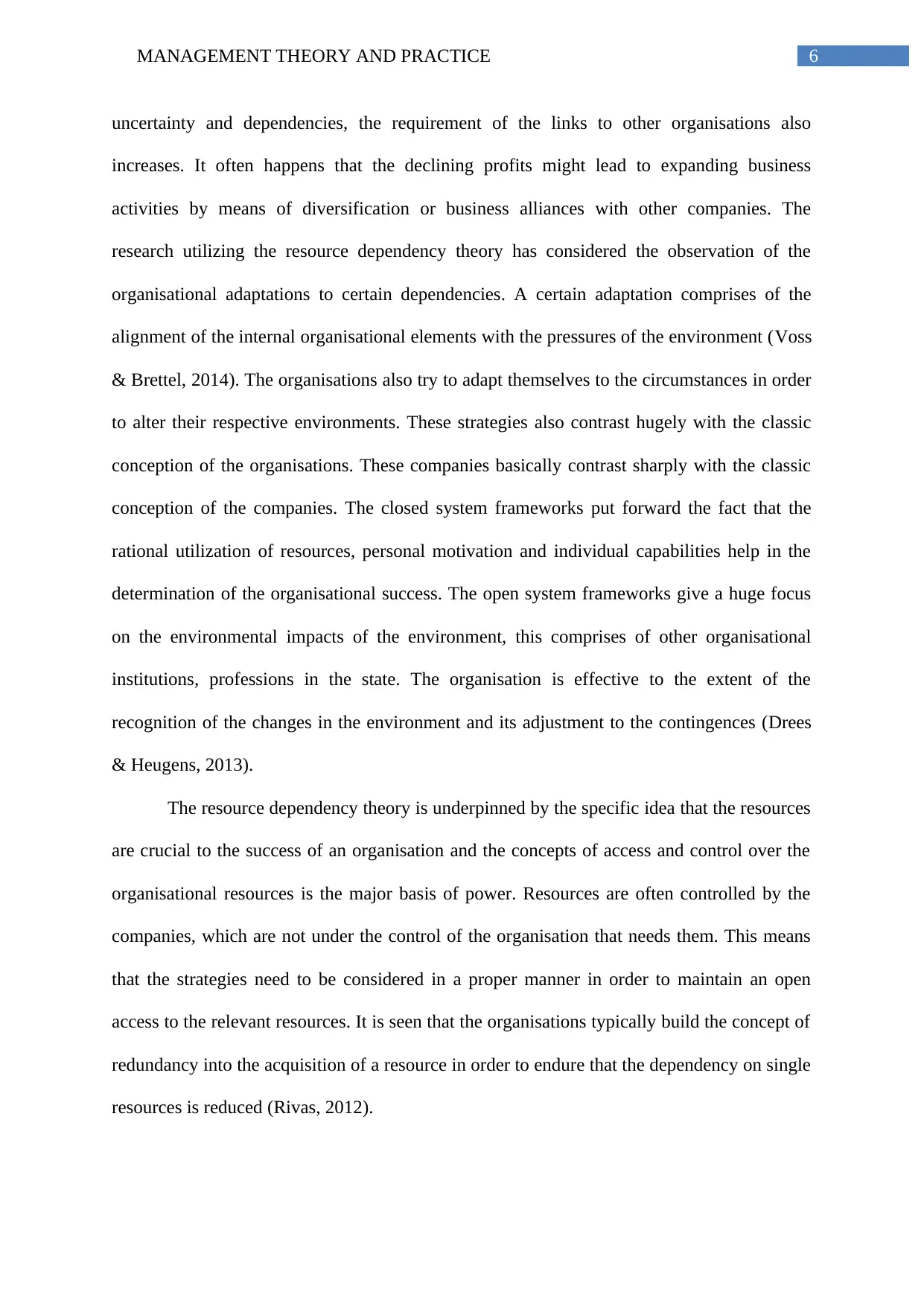
6MANAGEMENT THEORY AND PRACTICE
uncertainty and dependencies, the requirement of the links to other organisations also
increases. It often happens that the declining profits might lead to expanding business
activities by means of diversification or business alliances with other companies. The
research utilizing the resource dependency theory has considered the observation of the
organisational adaptations to certain dependencies. A certain adaptation comprises of the
alignment of the internal organisational elements with the pressures of the environment (Voss
& Brettel, 2014). The organisations also try to adapt themselves to the circumstances in order
to alter their respective environments. These strategies also contrast hugely with the classic
conception of the organisations. These companies basically contrast sharply with the classic
conception of the companies. The closed system frameworks put forward the fact that the
rational utilization of resources, personal motivation and individual capabilities help in the
determination of the organisational success. The open system frameworks give a huge focus
on the environmental impacts of the environment, this comprises of other organisational
institutions, professions in the state. The organisation is effective to the extent of the
recognition of the changes in the environment and its adjustment to the contingences (Drees
& Heugens, 2013).
The resource dependency theory is underpinned by the specific idea that the resources
are crucial to the success of an organisation and the concepts of access and control over the
organisational resources is the major basis of power. Resources are often controlled by the
companies, which are not under the control of the organisation that needs them. This means
that the strategies need to be considered in a proper manner in order to maintain an open
access to the relevant resources. It is seen that the organisations typically build the concept of
redundancy into the acquisition of a resource in order to endure that the dependency on single
resources is reduced (Rivas, 2012).
uncertainty and dependencies, the requirement of the links to other organisations also
increases. It often happens that the declining profits might lead to expanding business
activities by means of diversification or business alliances with other companies. The
research utilizing the resource dependency theory has considered the observation of the
organisational adaptations to certain dependencies. A certain adaptation comprises of the
alignment of the internal organisational elements with the pressures of the environment (Voss
& Brettel, 2014). The organisations also try to adapt themselves to the circumstances in order
to alter their respective environments. These strategies also contrast hugely with the classic
conception of the organisations. These companies basically contrast sharply with the classic
conception of the companies. The closed system frameworks put forward the fact that the
rational utilization of resources, personal motivation and individual capabilities help in the
determination of the organisational success. The open system frameworks give a huge focus
on the environmental impacts of the environment, this comprises of other organisational
institutions, professions in the state. The organisation is effective to the extent of the
recognition of the changes in the environment and its adjustment to the contingences (Drees
& Heugens, 2013).
The resource dependency theory is underpinned by the specific idea that the resources
are crucial to the success of an organisation and the concepts of access and control over the
organisational resources is the major basis of power. Resources are often controlled by the
companies, which are not under the control of the organisation that needs them. This means
that the strategies need to be considered in a proper manner in order to maintain an open
access to the relevant resources. It is seen that the organisations typically build the concept of
redundancy into the acquisition of a resource in order to endure that the dependency on single
resources is reduced (Rivas, 2012).
Paraphrase This Document
Need a fresh take? Get an instant paraphrase of this document with our AI Paraphraser
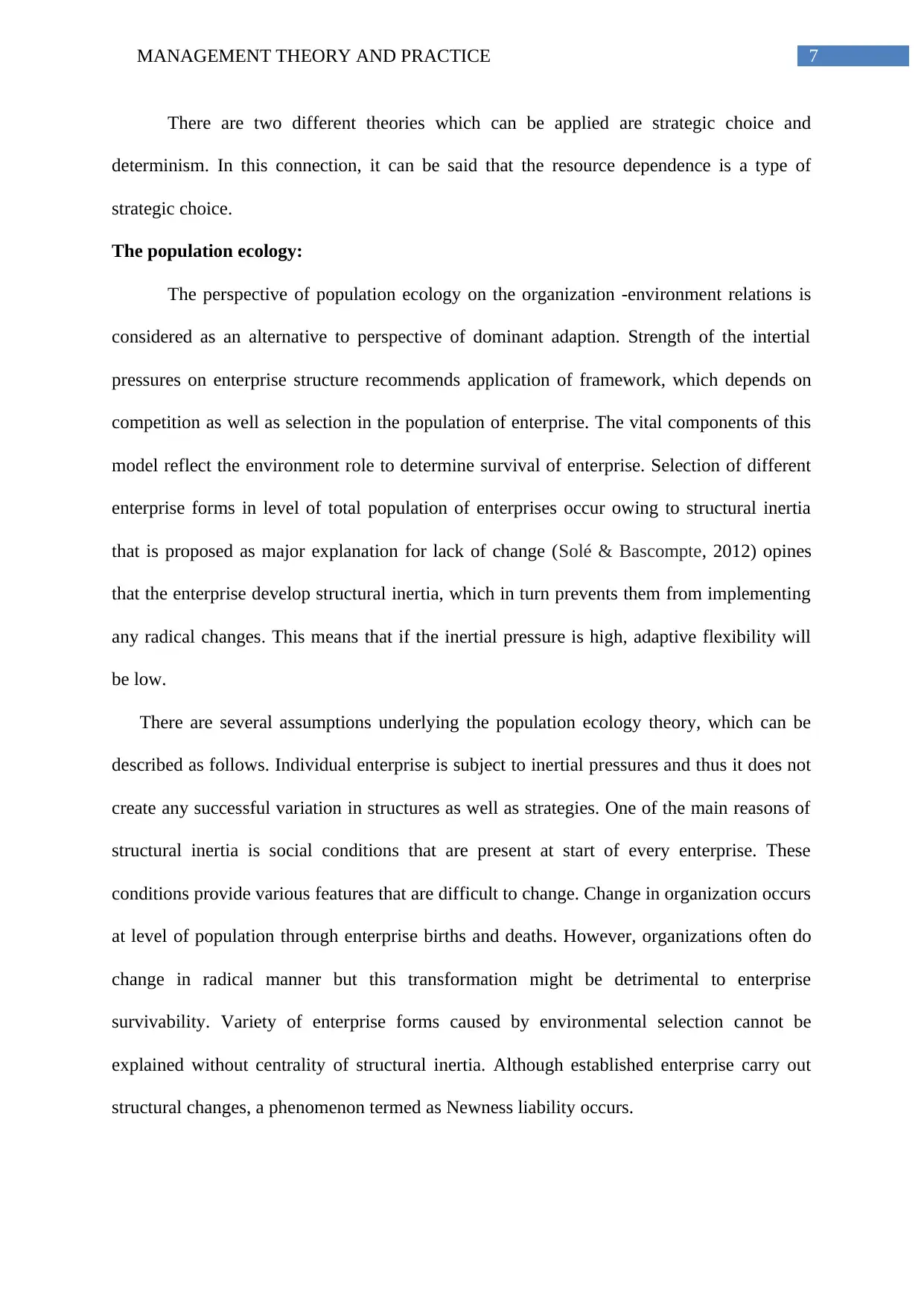
7MANAGEMENT THEORY AND PRACTICE
There are two different theories which can be applied are strategic choice and
determinism. In this connection, it can be said that the resource dependence is a type of
strategic choice.
The population ecology:
The perspective of population ecology on the organization -environment relations is
considered as an alternative to perspective of dominant adaption. Strength of the intertial
pressures on enterprise structure recommends application of framework, which depends on
competition as well as selection in the population of enterprise. The vital components of this
model reflect the environment role to determine survival of enterprise. Selection of different
enterprise forms in level of total population of enterprises occur owing to structural inertia
that is proposed as major explanation for lack of change (Solé & Bascompte, 2012) opines
that the enterprise develop structural inertia, which in turn prevents them from implementing
any radical changes. This means that if the inertial pressure is high, adaptive flexibility will
be low.
There are several assumptions underlying the population ecology theory, which can be
described as follows. Individual enterprise is subject to inertial pressures and thus it does not
create any successful variation in structures as well as strategies. One of the main reasons of
structural inertia is social conditions that are present at start of every enterprise. These
conditions provide various features that are difficult to change. Change in organization occurs
at level of population through enterprise births and deaths. However, organizations often do
change in radical manner but this transformation might be detrimental to enterprise
survivability. Variety of enterprise forms caused by environmental selection cannot be
explained without centrality of structural inertia. Although established enterprise carry out
structural changes, a phenomenon termed as Newness liability occurs.
There are two different theories which can be applied are strategic choice and
determinism. In this connection, it can be said that the resource dependence is a type of
strategic choice.
The population ecology:
The perspective of population ecology on the organization -environment relations is
considered as an alternative to perspective of dominant adaption. Strength of the intertial
pressures on enterprise structure recommends application of framework, which depends on
competition as well as selection in the population of enterprise. The vital components of this
model reflect the environment role to determine survival of enterprise. Selection of different
enterprise forms in level of total population of enterprises occur owing to structural inertia
that is proposed as major explanation for lack of change (Solé & Bascompte, 2012) opines
that the enterprise develop structural inertia, which in turn prevents them from implementing
any radical changes. This means that if the inertial pressure is high, adaptive flexibility will
be low.
There are several assumptions underlying the population ecology theory, which can be
described as follows. Individual enterprise is subject to inertial pressures and thus it does not
create any successful variation in structures as well as strategies. One of the main reasons of
structural inertia is social conditions that are present at start of every enterprise. These
conditions provide various features that are difficult to change. Change in organization occurs
at level of population through enterprise births and deaths. However, organizations often do
change in radical manner but this transformation might be detrimental to enterprise
survivability. Variety of enterprise forms caused by environmental selection cannot be
explained without centrality of structural inertia. Although established enterprise carry out
structural changes, a phenomenon termed as Newness liability occurs.
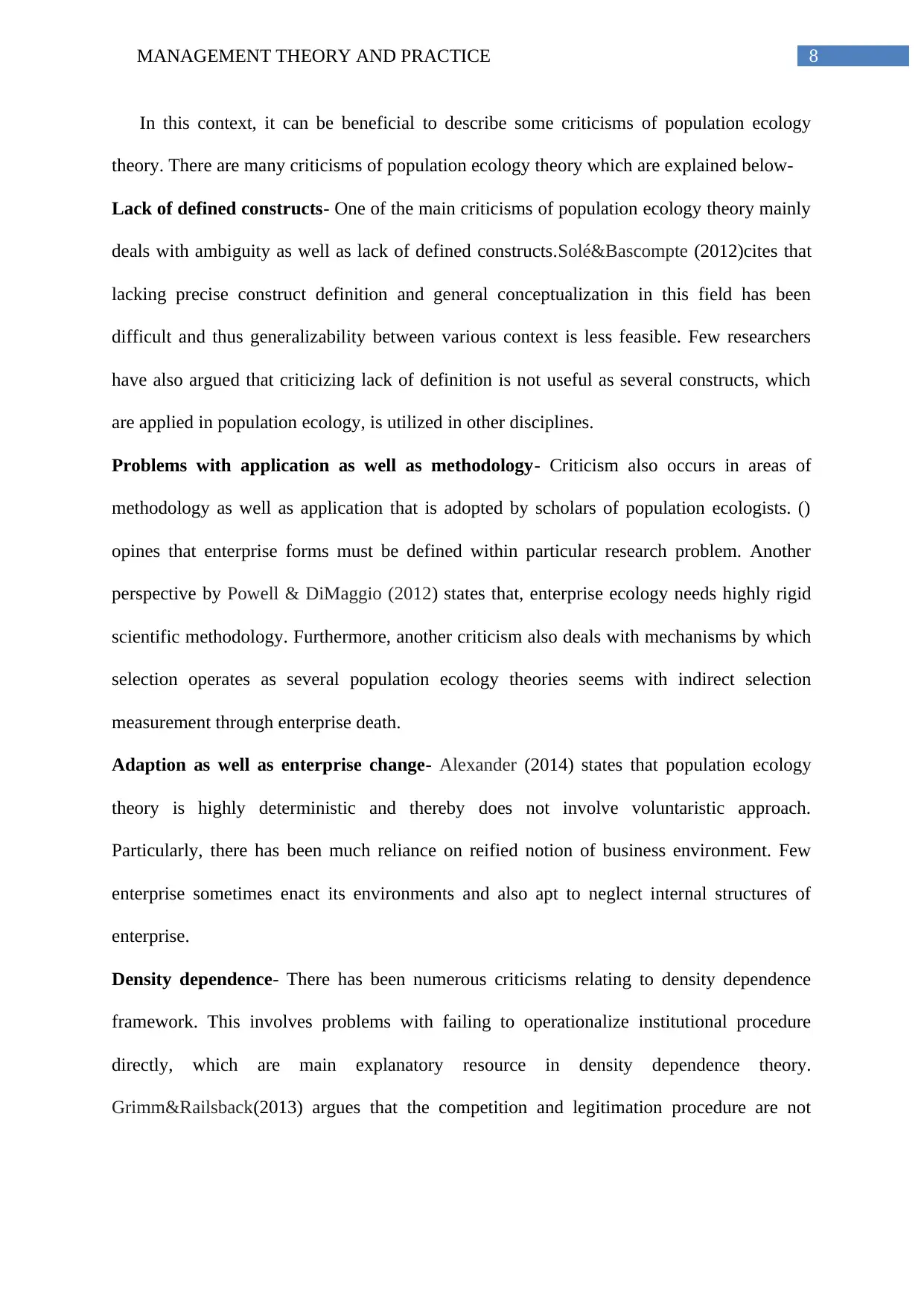
8MANAGEMENT THEORY AND PRACTICE
In this context, it can be beneficial to describe some criticisms of population ecology
theory. There are many criticisms of population ecology theory which are explained below-
Lack of defined constructs- One of the main criticisms of population ecology theory mainly
deals with ambiguity as well as lack of defined constructs.Solé&Bascompte (2012)cites that
lacking precise construct definition and general conceptualization in this field has been
difficult and thus generalizability between various context is less feasible. Few researchers
have also argued that criticizing lack of definition is not useful as several constructs, which
are applied in population ecology, is utilized in other disciplines.
Problems with application as well as methodology- Criticism also occurs in areas of
methodology as well as application that is adopted by scholars of population ecologists. ()
opines that enterprise forms must be defined within particular research problem. Another
perspective by Powell & DiMaggio (2012) states that, enterprise ecology needs highly rigid
scientific methodology. Furthermore, another criticism also deals with mechanisms by which
selection operates as several population ecology theories seems with indirect selection
measurement through enterprise death.
Adaption as well as enterprise change- Alexander (2014) states that population ecology
theory is highly deterministic and thereby does not involve voluntaristic approach.
Particularly, there has been much reliance on reified notion of business environment. Few
enterprise sometimes enact its environments and also apt to neglect internal structures of
enterprise.
Density dependence- There has been numerous criticisms relating to density dependence
framework. This involves problems with failing to operationalize institutional procedure
directly, which are main explanatory resource in density dependence theory.
Grimm&Railsback(2013) argues that the competition and legitimation procedure are not
In this context, it can be beneficial to describe some criticisms of population ecology
theory. There are many criticisms of population ecology theory which are explained below-
Lack of defined constructs- One of the main criticisms of population ecology theory mainly
deals with ambiguity as well as lack of defined constructs.Solé&Bascompte (2012)cites that
lacking precise construct definition and general conceptualization in this field has been
difficult and thus generalizability between various context is less feasible. Few researchers
have also argued that criticizing lack of definition is not useful as several constructs, which
are applied in population ecology, is utilized in other disciplines.
Problems with application as well as methodology- Criticism also occurs in areas of
methodology as well as application that is adopted by scholars of population ecologists. ()
opines that enterprise forms must be defined within particular research problem. Another
perspective by Powell & DiMaggio (2012) states that, enterprise ecology needs highly rigid
scientific methodology. Furthermore, another criticism also deals with mechanisms by which
selection operates as several population ecology theories seems with indirect selection
measurement through enterprise death.
Adaption as well as enterprise change- Alexander (2014) states that population ecology
theory is highly deterministic and thereby does not involve voluntaristic approach.
Particularly, there has been much reliance on reified notion of business environment. Few
enterprise sometimes enact its environments and also apt to neglect internal structures of
enterprise.
Density dependence- There has been numerous criticisms relating to density dependence
framework. This involves problems with failing to operationalize institutional procedure
directly, which are main explanatory resource in density dependence theory.
Grimm&Railsback(2013) argues that the competition and legitimation procedure are not
⊘ This is a preview!⊘
Do you want full access?
Subscribe today to unlock all pages.

Trusted by 1+ million students worldwide
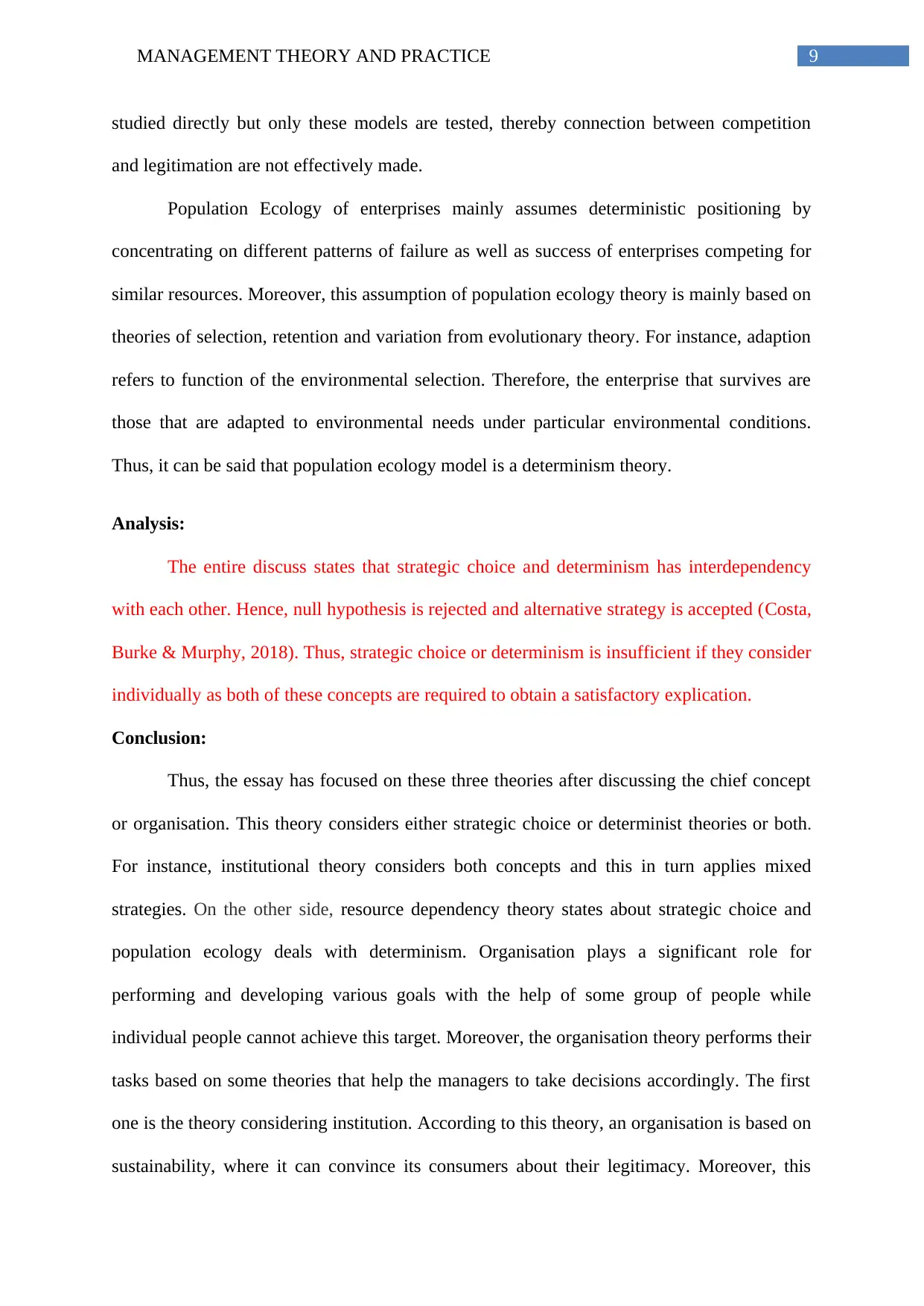
9MANAGEMENT THEORY AND PRACTICE
studied directly but only these models are tested, thereby connection between competition
and legitimation are not effectively made.
Population Ecology of enterprises mainly assumes deterministic positioning by
concentrating on different patterns of failure as well as success of enterprises competing for
similar resources. Moreover, this assumption of population ecology theory is mainly based on
theories of selection, retention and variation from evolutionary theory. For instance, adaption
refers to function of the environmental selection. Therefore, the enterprise that survives are
those that are adapted to environmental needs under particular environmental conditions.
Thus, it can be said that population ecology model is a determinism theory.
Analysis:
The entire discuss states that strategic choice and determinism has interdependency
with each other. Hence, null hypothesis is rejected and alternative strategy is accepted (Costa,
Burke & Murphy, 2018). Thus, strategic choice or determinism is insufficient if they consider
individually as both of these concepts are required to obtain a satisfactory explication.
Conclusion:
Thus, the essay has focused on these three theories after discussing the chief concept
or organisation. This theory considers either strategic choice or determinist theories or both.
For instance, institutional theory considers both concepts and this in turn applies mixed
strategies. On the other side, resource dependency theory states about strategic choice and
population ecology deals with determinism. Organisation plays a significant role for
performing and developing various goals with the help of some group of people while
individual people cannot achieve this target. Moreover, the organisation theory performs their
tasks based on some theories that help the managers to take decisions accordingly. The first
one is the theory considering institution. According to this theory, an organisation is based on
sustainability, where it can convince its consumers about their legitimacy. Moreover, this
studied directly but only these models are tested, thereby connection between competition
and legitimation are not effectively made.
Population Ecology of enterprises mainly assumes deterministic positioning by
concentrating on different patterns of failure as well as success of enterprises competing for
similar resources. Moreover, this assumption of population ecology theory is mainly based on
theories of selection, retention and variation from evolutionary theory. For instance, adaption
refers to function of the environmental selection. Therefore, the enterprise that survives are
those that are adapted to environmental needs under particular environmental conditions.
Thus, it can be said that population ecology model is a determinism theory.
Analysis:
The entire discuss states that strategic choice and determinism has interdependency
with each other. Hence, null hypothesis is rejected and alternative strategy is accepted (Costa,
Burke & Murphy, 2018). Thus, strategic choice or determinism is insufficient if they consider
individually as both of these concepts are required to obtain a satisfactory explication.
Conclusion:
Thus, the essay has focused on these three theories after discussing the chief concept
or organisation. This theory considers either strategic choice or determinist theories or both.
For instance, institutional theory considers both concepts and this in turn applies mixed
strategies. On the other side, resource dependency theory states about strategic choice and
population ecology deals with determinism. Organisation plays a significant role for
performing and developing various goals with the help of some group of people while
individual people cannot achieve this target. Moreover, the organisation theory performs their
tasks based on some theories that help the managers to take decisions accordingly. The first
one is the theory considering institution. According to this theory, an organisation is based on
sustainability, where it can convince its consumers about their legitimacy. Moreover, this
Paraphrase This Document
Need a fresh take? Get an instant paraphrase of this document with our AI Paraphraser
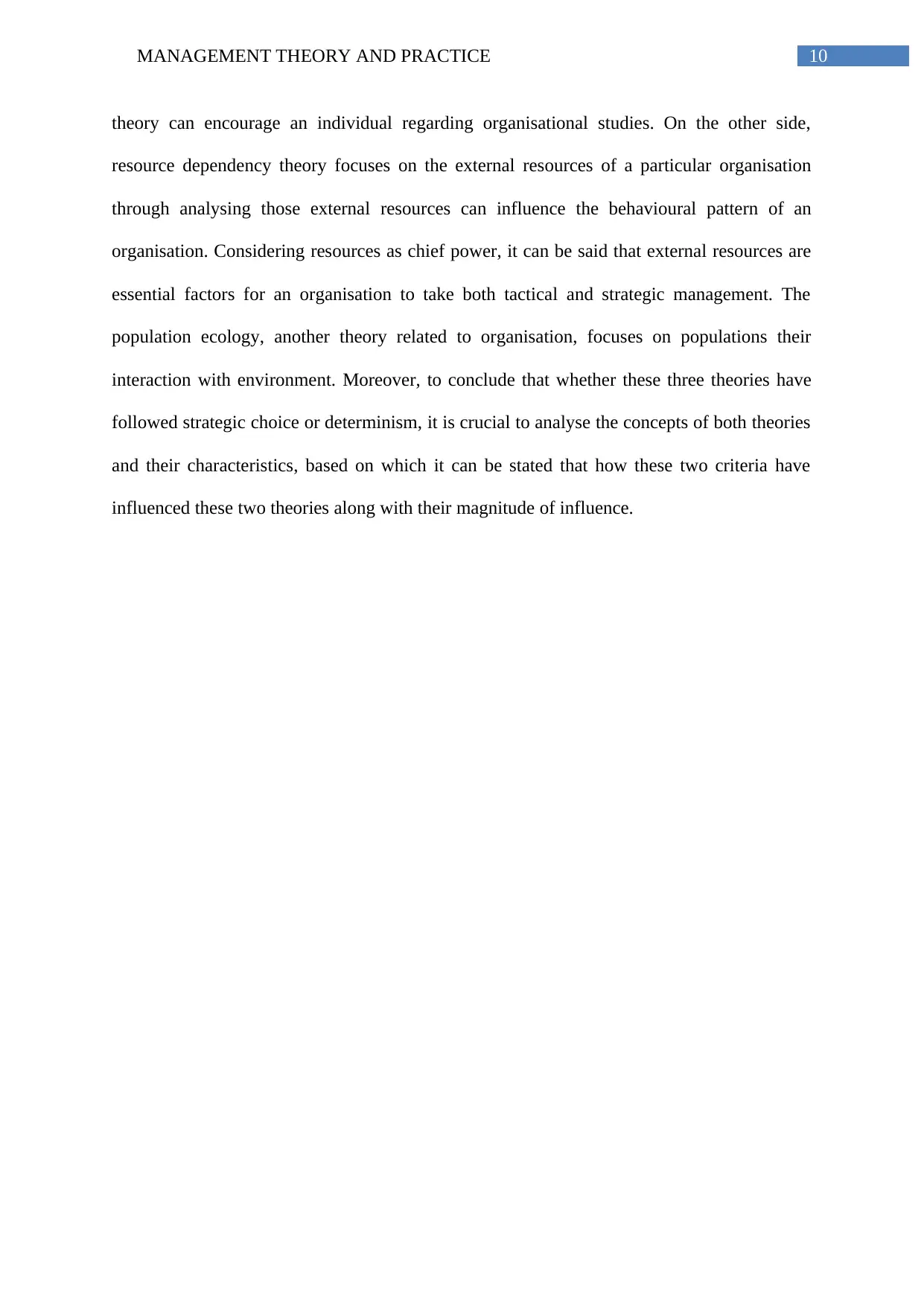
10MANAGEMENT THEORY AND PRACTICE
theory can encourage an individual regarding organisational studies. On the other side,
resource dependency theory focuses on the external resources of a particular organisation
through analysing those external resources can influence the behavioural pattern of an
organisation. Considering resources as chief power, it can be said that external resources are
essential factors for an organisation to take both tactical and strategic management. The
population ecology, another theory related to organisation, focuses on populations their
interaction with environment. Moreover, to conclude that whether these three theories have
followed strategic choice or determinism, it is crucial to analyse the concepts of both theories
and their characteristics, based on which it can be stated that how these two criteria have
influenced these two theories along with their magnitude of influence.
theory can encourage an individual regarding organisational studies. On the other side,
resource dependency theory focuses on the external resources of a particular organisation
through analysing those external resources can influence the behavioural pattern of an
organisation. Considering resources as chief power, it can be said that external resources are
essential factors for an organisation to take both tactical and strategic management. The
population ecology, another theory related to organisation, focuses on populations their
interaction with environment. Moreover, to conclude that whether these three theories have
followed strategic choice or determinism, it is crucial to analyse the concepts of both theories
and their characteristics, based on which it can be stated that how these two criteria have
influenced these two theories along with their magnitude of influence.
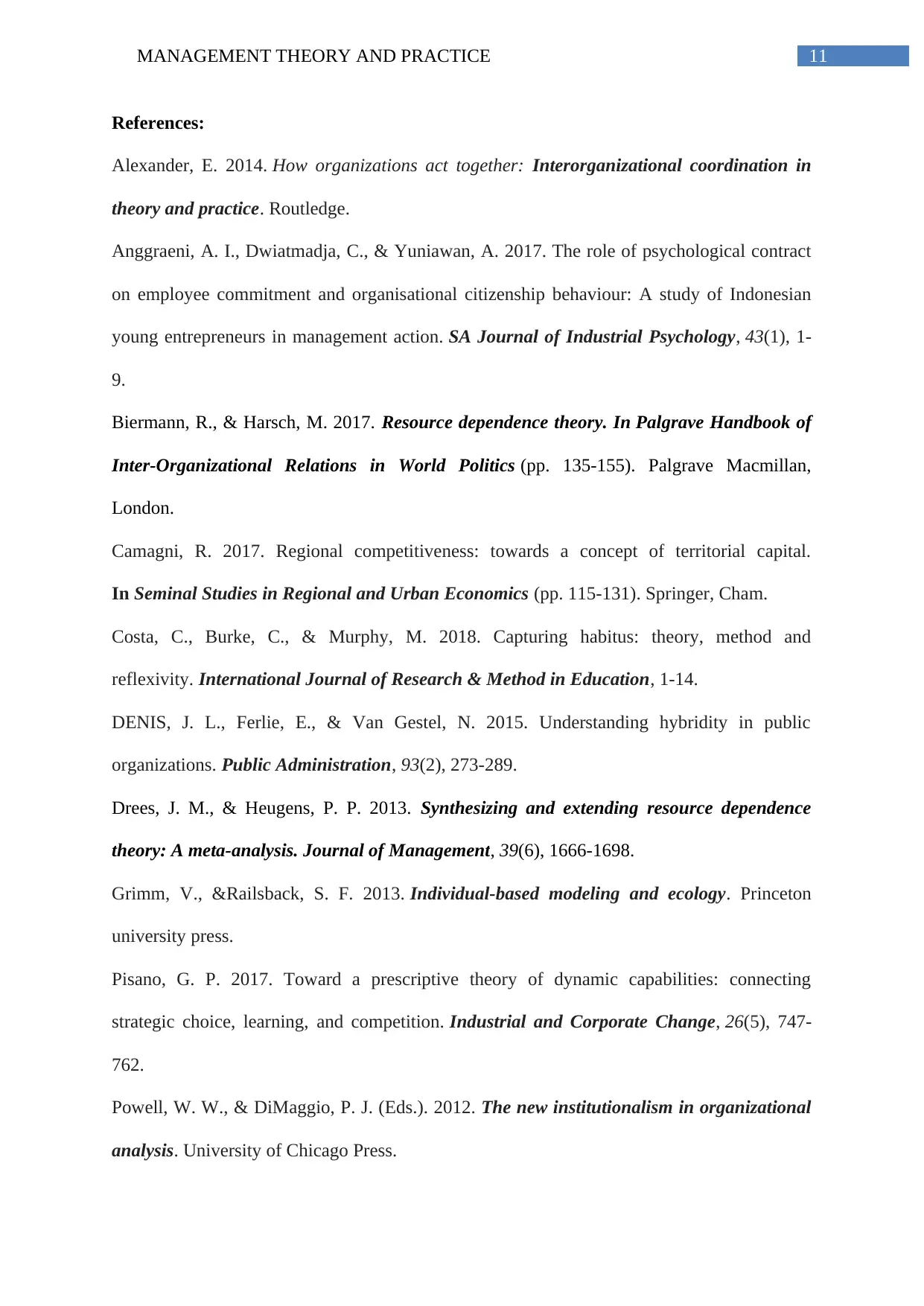
11MANAGEMENT THEORY AND PRACTICE
References:
Alexander, E. 2014. How organizations act together: Interorganizational coordination in
theory and practice. Routledge.
Anggraeni, A. I., Dwiatmadja, C., & Yuniawan, A. 2017. The role of psychological contract
on employee commitment and organisational citizenship behaviour: A study of Indonesian
young entrepreneurs in management action. SA Journal of Industrial Psychology, 43(1), 1-
9.
Biermann, R., & Harsch, M. 2017. Resource dependence theory. In Palgrave Handbook of
Inter-Organizational Relations in World Politics (pp. 135-155). Palgrave Macmillan,
London.
Camagni, R. 2017. Regional competitiveness: towards a concept of territorial capital.
In Seminal Studies in Regional and Urban Economics (pp. 115-131). Springer, Cham.
Costa, C., Burke, C., & Murphy, M. 2018. Capturing habitus: theory, method and
reflexivity. International Journal of Research & Method in Education, 1-14.
DENIS, J. L., Ferlie, E., & Van Gestel, N. 2015. Understanding hybridity in public
organizations. Public Administration, 93(2), 273-289.
Drees, J. M., & Heugens, P. P. 2013. Synthesizing and extending resource dependence
theory: A meta-analysis. Journal of Management, 39(6), 1666-1698.
Grimm, V., &Railsback, S. F. 2013. Individual-based modeling and ecology. Princeton
university press.
Pisano, G. P. 2017. Toward a prescriptive theory of dynamic capabilities: connecting
strategic choice, learning, and competition. Industrial and Corporate Change, 26(5), 747-
762.
Powell, W. W., & DiMaggio, P. J. (Eds.). 2012. The new institutionalism in organizational
analysis. University of Chicago Press.
References:
Alexander, E. 2014. How organizations act together: Interorganizational coordination in
theory and practice. Routledge.
Anggraeni, A. I., Dwiatmadja, C., & Yuniawan, A. 2017. The role of psychological contract
on employee commitment and organisational citizenship behaviour: A study of Indonesian
young entrepreneurs in management action. SA Journal of Industrial Psychology, 43(1), 1-
9.
Biermann, R., & Harsch, M. 2017. Resource dependence theory. In Palgrave Handbook of
Inter-Organizational Relations in World Politics (pp. 135-155). Palgrave Macmillan,
London.
Camagni, R. 2017. Regional competitiveness: towards a concept of territorial capital.
In Seminal Studies in Regional and Urban Economics (pp. 115-131). Springer, Cham.
Costa, C., Burke, C., & Murphy, M. 2018. Capturing habitus: theory, method and
reflexivity. International Journal of Research & Method in Education, 1-14.
DENIS, J. L., Ferlie, E., & Van Gestel, N. 2015. Understanding hybridity in public
organizations. Public Administration, 93(2), 273-289.
Drees, J. M., & Heugens, P. P. 2013. Synthesizing and extending resource dependence
theory: A meta-analysis. Journal of Management, 39(6), 1666-1698.
Grimm, V., &Railsback, S. F. 2013. Individual-based modeling and ecology. Princeton
university press.
Pisano, G. P. 2017. Toward a prescriptive theory of dynamic capabilities: connecting
strategic choice, learning, and competition. Industrial and Corporate Change, 26(5), 747-
762.
Powell, W. W., & DiMaggio, P. J. (Eds.). 2012. The new institutionalism in organizational
analysis. University of Chicago Press.
⊘ This is a preview!⊘
Do you want full access?
Subscribe today to unlock all pages.

Trusted by 1+ million students worldwide
1 out of 13
Related Documents
Your All-in-One AI-Powered Toolkit for Academic Success.
+13062052269
info@desklib.com
Available 24*7 on WhatsApp / Email
![[object Object]](/_next/static/media/star-bottom.7253800d.svg)
Unlock your academic potential
Copyright © 2020–2026 A2Z Services. All Rights Reserved. Developed and managed by ZUCOL.



